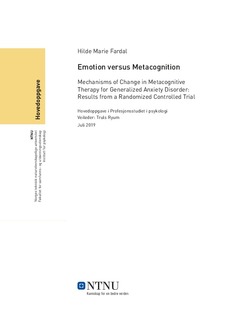Emotion versus Metacognition - Mechanisms of Change in Metacognitive Therapy for Generalized Anxiety Disorder: Results from a Randomized Controlled Trial
Master thesis
Permanent lenke
http://hdl.handle.net/11250/2624906Utgivelsesdato
2019Metadata
Vis full innførselSamlinger
- Institutt for psykologi [3109]
Sammendrag
The data were retrieved from a study comparing metacognitive therapy (MCT) to cognitive behavioral therapy (CBT) in the treatment of generalized anxiety disorder (GAD), led by Hans Nordahl. The main objective of the current study was to compare metacognition and emotional arousal as change-mechanisms in MCT for adult patients with GAD. 20 patients were included in the analysis. The Metacognition Questionnaire-30 (MCQ-30) and the Achievement of Therapeutic Objectives Scale (ATOS) were used as process measures. Only the third ATOS subscale, "Affect experiencing", was included in the analysis. This subscale targets the patients’ arousal of adaptive affect. Treatment outcome was measured by the Penn-State Worry Quesionnaire (PSWQ). To the author’s knowledge, this is the first study comparing change in metacognition to change in emotional arousal as predictors of outcome in MCT. The main finding was that both variables were shown to be important and separate predictors of treatment outcome. Two hierarchical multiple regressions were computed to determine whether change in the process measures predicted change in the outcome measure. The variables "Change in adaptive affect" and "Change in MCQ-30" explained respectively 41.1% and 39.9% of the variance in post treatment PSWQ when examined separately. Next, both variables were examined in the same analysis. The explained variance in post treatment PSWQ increased with 14.4% when "Change in MCQ-30" was added to "Change in adaptive affect", and with 15.6% when "Change in adaptive affect" was added to "Change in MCQ-30". In conclusion, this preliminary study implies that metacognition and emotional arousal are separate and equally important change-mechanisms on a within-person level in MCT for GAD.
